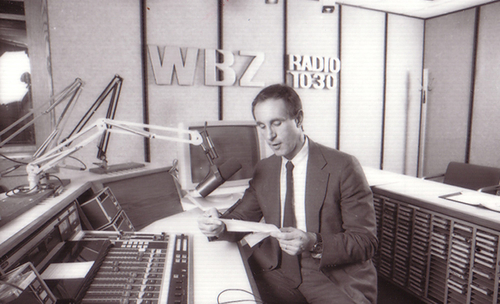
TO MARK David Brudnoy's 25th anniversary as a talk show host, WBZ Radio put out a glowing press release hailing "the longest continual, virtually uninterrupted tenure of a weekday radio talk show in Boston history."
Virtually uninterrupted? Hiding behind that adverb was the unpleasantness of 1990, when WBZ cancelled Brudnoy's top-rated nightly program and replaced it, presumably to save money, with a cheaper syndicated show from out of town. It was an unfathomable decision, an easy finalist in the Most Boneheaded Move By A Radio Executive competition. Broadcast professionals were amazed. Inside Radio, a trade newsletter, headlined its story: "WBZ-AM, Boston Slits Its Own Throat Late-Night."
That about summed it up. The protests flooded in by the thousands, and not just to WBZ but to its owner, Westinghouse Broadcasting, as well. "Spenser" author Robert Parker, appearing for what it seemed would be the last time on Brudnoy's program, fumed, "Do we have time to bad-mouth 'BZ for letting you go? The people who run this station are stupid." The Boston Globe called Brudnoy's ouster a "genuine shame" and a "debacle" and marveled at the "nonsensicalness" of it all. In a lead editorial, the Boston Herald urged WBZ to reverse course. "David Brudnoy is a Boston institution," it said, "and all of us -- really, all of us -- miss him."
Full disclosure: I wrote that editorial. Even fuller disclosure: Brudnoy and I have been friends for years, and over those years I've often had the pleasure of being on his show, both as guest and as guest host. But even in 1990 you didn't have to know Brudnoy personally to understand that life in Boston would have been markedly poorer if his nightly conversation -- intelligent, informed, articulate, good-natured -- had ceased being a part of it. Happily, WBZ soon saw the error of its ways, and restored him to his microphone. The station manager responsible for the blunder is long gone.
And 11 years later, Brudnoy is still No. 1 in the ratings.
They are something of a paradox, those ratings. On the one hand, it is easy to enumerate the virtues of Brudnoy's brand of talk radio. His program is erudite but accessible -- "smart talk for everyone," the Globe once called it. He lets his callers have their say and often gives them the last word. He really reads the books of the authors he interviews (and he interviews an awful lot of authors). He is polite, even courtly, to his guests. He absolutely refuses to play to the groundlings: there are no sex jokes, no double entendres, no phony bombast, no psychics, no vulgar sound effects, no webcam.
If you've got half a brain and a dab of intellectual curiosity, how could you not like the Brudnoy show?
Yet Brudnoy's formula is just the one most talk shows avoid.
Ninety-nine talkmasters out of 100 will tell you that cerebral, talky, courteous, ideas-heavy radio programming is sure death in the ratings book. Their market research doubtless proves that listeners have no interest in the kind of show Brudnoy does. Except that, manifestly, they do. And have, for 25 years.
Some months ago, I e-mailed David an eye-opening article by Michael Ledeen on Africa's AIDS crisis, with a note suggesting that it might make a great radio topic. I cc'd the note to Ledeen, a resident scholar at the American Enterprise Institute in Washington, and promptly got a message back. "I LOVE David Brudnoy, the single most literate man on the radio." Countless scholars, authors, and assorted eminentoes would agree.
But authors, scholars, and eminentoes do not generate high ratings. Tens of thousands of loyal listeners, white- and blue-collar both, do -- and do they really care about AIDS in Africa?
Jon Keller, political analyst at WLVI-TV (and one-time producer for the David Brudnoy Show), recalls the time he was covering a story at the Grove Hall fire station. "And there were all these tough-as-nails firefighters sitting by a radio, listening to Brudnoy," Keller says. "I asked one of them why he liked it. You know what he answered? 'He tells me stuff I don't already know.'"
Would that guy listen to a conversation about an AIDS epidemic halfway around the world? You bet he would.
Delivering the commencement address at Salem State College last month, Dr. Brudnoy -- he actually has a fistful of earned degrees to go with the honorary one -- made a point of distinguishing fake "diversity" from the genuine article.
"One diversity stands above all else," he told the graduates. "Diversity of the brain. It's not how we look or what our last name is or what our grandparents' linguistic group is or what our sexual orientation is, but what and how we think that matters.... Ideas are the product of individuals, and it is individual diversity, which flows from the mind, that matters. But how often do we hear people talk ... about diversity of ideas? Never."
Well, maybe not never. In most of the eastern United States, you can hear ideas in all their diversity take center stage five nights a week, three hours per night, on WBZ-AM1030, where the night's best conversation -- and David Brudnoy's second quarter-century -- is underway.
(Jeff Jacoby is a columnist for The Boston Globe).
-- ## --
Follow Jeff Jacoby on Twitter.
"Like" Jeff Jacoby's columns on Facebook.
Want to read more Jeff Jacoby? Sign up for "Arguable," his free weekly email newsletter

